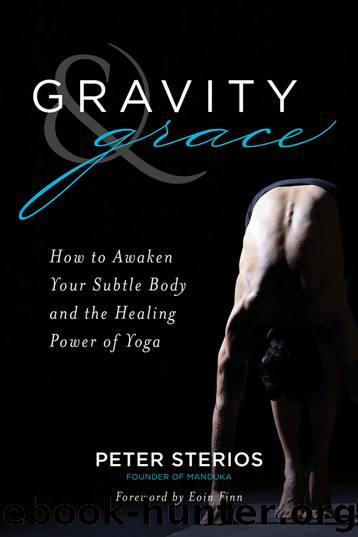Gravity & Grace by Peter Sterios

Author:Peter Sterios
Language: eng
Format: epub
Publisher: Sounds True
Integrating regular doses of humor into our life, our practice, and our yoga is one of the easiest and most efficient ways to establish beneficial changes in the neurochemistry of our brain and bring about consistent heart-brain coherence, especially if we are experiencing a life-threatening disease. Author Norman Cousins, who healed himself from several such illnesses, in part using humor, writes, “Of all the gifts bestowed by nature on human beings, hardy laughter must be close to the top.”81
We’ve all heard the adage “laughter is the best medicine.” Laughter truly is one of the most underrated tools in our healing repertoire — free, readily available, with no unwanted side effects, and now substantiated by a growing body of research. According to Pearsall, one study has shown that twenty seconds of guffawing gives the heart the same beneficial workout as three minutes of hard rowing; other studies have indicated that even people hearing laughter experience benefits, too.82
As a teacher, I find the use of humor, like the act of teaching itself, a very intuitive exercise, involving pauses that appear in the stream of thoughts or spoken words used to communicate a concept or idea, pauses that allow other info-energy to flow. The process opens up opportunities to respond in the moment; to observe what is present in the class; to receive energetic signals from the students’ presence, moods, energies, comments, and questions; and to follow what comes naturally in response.
As my abilities to find humor have developed, I have seen that, like intuition, humor is never 100 percent “on point,” especially when it comes to timing. So when a “serious” attempt at intuitive humor falls flat, I try to stay in the moment and respond to the students’ sometimes confused silence in a fully present way. I often wait until the silence is deafening and then say something like, “Yes, in case you didn’t realize, that was an attempt at humor.” I may go on to explain that good humor requires a sophisticated audience that is familiar with the fine arts of nuance and subtlety, and that when my humor is beyond my audience’s abilities, I usually resort to bad humor! This is always good for a short burst of nervous laughter, the kind of laughter we habitually resort to when someone we care about tells a bad joke. Surprisingly, even “bad” humor (think “dad jokes”) can initiate the necessary energetic shift and has the potential to produce effects on our nervous system similar to “good” humor.
Integrating humor or lightheartedness into your practice when you’re by yourself is a different matter, of course. It’s not so much about telling jokes to yourself; rather, it has more to do with not taking yourself too seriously. Although yoga practice often requires strong resolve, not being intensely serious about it makes time spent practicing more enjoyable. But how can you do that?
Start by taking your time. Build pauses into your practice — when it comes to levity, there’s no rush. Then use your imaginative powers of visualization.
Download
This site does not store any files on its server. We only index and link to content provided by other sites. Please contact the content providers to delete copyright contents if any and email us, we'll remove relevant links or contents immediately.
| Acupuncture & Acupressure | Aromatherapy |
| Ayurveda | Chelation |
| Chinese Medicine | Energy Healing |
| Healing | Herbal Remedies |
| Holistic | Homeopathy |
| Hypnotherapy | Massage |
| Meditation | Naturopathy |
| Reference |
Inner Engineering: A Yogi's Guide to Joy by Sadhguru(6794)
The Power of Now: A Guide to Spiritual Enlightenment by Eckhart Tolle(5781)
Fear by Osho(4740)
Ikigai by Héctor García & Francesc Miralles(4274)
The Art of Happiness by The Dalai Lama(4130)
The Ultimate Bodybuilding Cookbook by Kendall Lou Schmidt(3945)
Yoga Therapy by Mark Stephens(3749)
The Little Book of Hygge by Meik Wiking(3693)
The Healing Self by Deepak Chopra(3578)
Why Buddhism is True by Robert Wright(3453)
The Hatha Yoga Pradipika (Translated) by Svatmarama(3342)
Being Aware of Being Aware by Rupert Spira(3276)
Shift into Freedom by Loch Kelly(3199)
Wild Words from Wild Women by Stephens Autumn(3153)
Work Clean by Dan Charnas(3123)
Happiness by Matthieu Ricard(3048)
More Language of Letting Go: 366 New Daily Meditations by Melody Beattie(3030)
Yoga Body & Mind Handbook by Jasmine Tarkeshi(2879)
Why I Am Not a Feminist by Jessa Crispin(2760)
